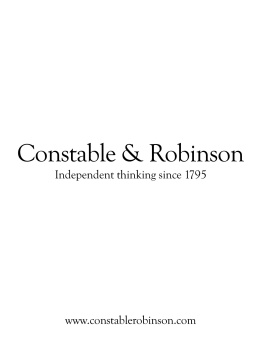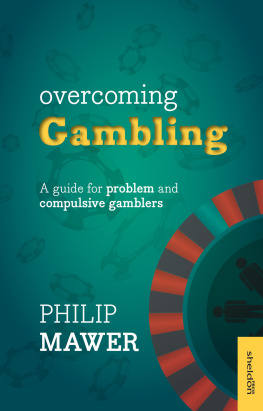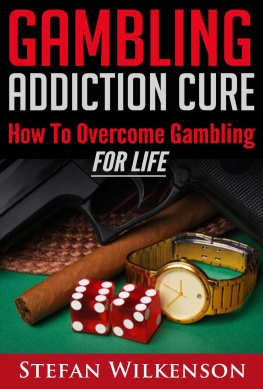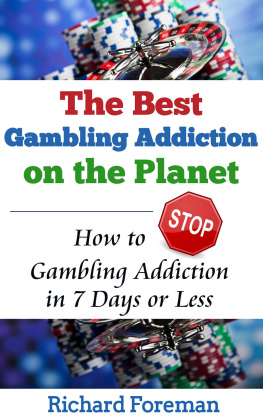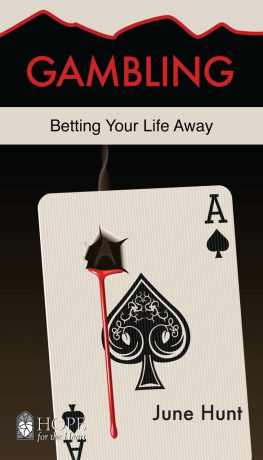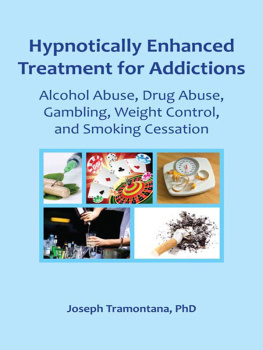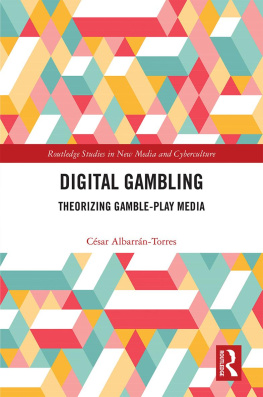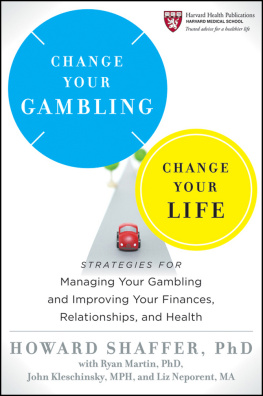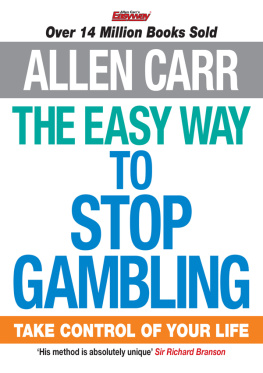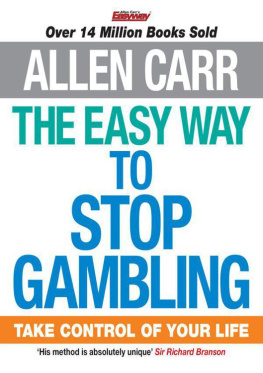Professor Alex Blaszczynski is a practising clinical psycologist and member of the Psychiatry Research and Teaching Unit, School of Psychiatry, University of South Wales.
The aim of the Overcoming series is to enable people with a range of common problems and disorders to take control of their own recovery program. Each title, with its specially tailored program, is devised by a practising clinician using the latest techniques of cognitive behavioral therapy techniques which have been shown to be highly effective in changing the way patients think about themselves and their problems. The series was initiated in 1993 by Peter Cooper, Professor of Psychology at Reading University and Research Fellow at the University of Cambridge in the UK, whose original volume on overcoming bulimia nervosa and binge-eating continues to help many people in the USA, UK, Europe and Australasia. Many books in the Overcoming series are recommended by the UK Department of Health under the Books on Prescription scheme.
Other titles in the series include:
OVERCOMING ANGER AND IRRITABILITY
OVERCOMING ANOREXIA NERVOSA
OVERCOMING ANXIETY
OVERCOMING OVERCOMING BODY IMAGE PROBLEMS
BULIMIA NERVOSA AND BINGE-EATING
OVERCOMING CHILDHOOD TRAUMA
OVERCOMING CHRONIC FATIGUE
OVERCOMING CHRONIC PAIN
OVERCOMING DEPERSONALIZATON AND FEELINGS OF UNREALITY
OVERCOMING DEPRESSION
OVERCOMING GRIEF
OVERCOMING INSOMNIA AND SLEEP PROBLEMS
OVERCOMING LOW SELF-ESTEEM
OVERCOMING MOOD SWINGS
OVERCOMING OBSESSIVE COMPULSIVE DISORDER
OVERCOMING PANIC
OVERCOMING PARANOID AND SUSPICIOUS THOUGHTS
OVERCOMING PROBLEM DRINKING
OVERCOMING RELATIONSHIP PROBLEMS
OVERCOMING SEXUAL PROBLEMS
OVERCOMING SOCIAL ANXIETY AND SHYNESS
OVERCOMING STRESS
OVERCOMING TRAUMATIC STRESS
OVERCOMING WEIGHT PROBLEMS
OVERCOMING WORRY
OVERCOMING YOUR CHILDS FEARS AND WORRIES
OVERCOMING YOUR CHILDS SHYNESS AND SOCIAL ANXIETY
OVERCOMING YOUR SMOKING HABIT
All titles in the series are available by mail order.
Please see the order form at the back of this book.
www.overcoming.co.uk
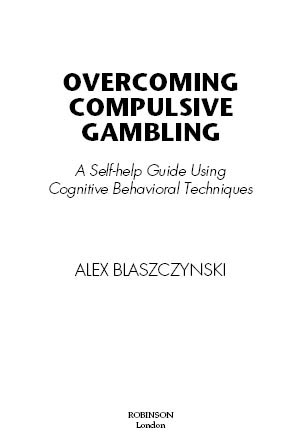
Constable & Robinson
3 The Lanchesters
162 Fulham Palace Road
London W6 9ER
www.constablerobinson.com
First published in the UK by Robinson, an imprint of Constable & Robinson Ltd, 1998
This edition published 2010
Copyright Alex Blaszczynski 1998, 2010
All rights reserved. This book is sold subject to the condition that it shall not, by way of trade or otherwise, be lent, re-sold, hired out or otherwise circulated in any form of binding or cover other than that in which it is published and without a similar condition including this condition being imposed on the subsequent purchaser.
The right of Alex Blaszczynski to be identified as author of this work has been asserted by him in accordance with the Copyright, Designs and Patents Act, 1988.
A copy of the British Library Cataloguing in Publication Data is available from the British Library.
Important Note
This book is not intended to be a substitute for medical advice or treatment. Any person with a condition requiring medical attention should consult a qualified medical practitioner or suitable therapist.
ISBN 978-1-84901-133-4
Typeset by TW Typesetting, Plymouth, Devon Printed and bound in the EU
2 4 6 8 10 9 7 5 3
Table of contents
PART ONE: About Problem Gambling
PART TWO: A Self-help Cognitive Behavioral Approach to Overcoming Problem Gambling
Acknowledgments
This self-help guide is based in large part on the theories of learning which form the foundation of cognitive and behavioral clinical psychology. The approach to managing problem gambling around which this guide to recovery is written is derived from many years of researching a broad range of impulse control disorders and in particular working with clients who suffer severe gambling problems. The essential core of our treatment guide is a relaxation technique called imaginal desensitization. This technique has been successfully modified and applied to what we call impulse-driven behaviors by the eminent Australian psychiatrist Professor Nathaniel McConaghy MD, DSc. (Impulse-driven is a term used to refer to repetitive behaviors which are in some respects pleasurable but result in harm, whether to the person performing them, to his or her close associates and family members, or to others.) This work was carried out in Sydney, Australia, at the Prince of Wales Hospital Psychiatric Unit, which is part of the University of New South Wales teaching hospitals complex.
I am enormously indebted to Professor McConaghy for his guidance and support throughout the years of our association. I have learned much from this scholar, gaining an immeasurable respect for his intellectual rigor and the methodological precision which he applied to his research work, and the clinical acumen and genuine care displayed in the management of his patients. From the beginning of my career to the present day, he has been my mentor and source of inspiration.
This book has been beaten and moulded into its final form through the contributions of many people: academics, friends and laymen. I am especially thankful to all the gamblers who have, through their suffering, given me a greater understanding of the complexities underlying the mechanism of self-control.
A number of valued colleagues and friends, notably Derrick Silove, Vijaya Manicavasagar and Sue Cremer, have provided constructive criticism and astute advice and have devoted time and energy to reading and editing the manuscript. In particular, I would like to thank Jackie Curtis for providing insightful comments and suggestions on improving the quality of the self-help guide in Part Two.
I must thank Peter Cooper for his recognition of the need for a self-help book on problem gambling and for his endeavours on my behalf to convince the editors of the value of this book.
In all, I thank my wife Pamela and sons Kristian and Stefan for their generous support and love; and my parents, brother and grandmother for their direction and encouragement in life.
Preface
We know that, for many adults, gambling is a form of entertainment in which they play hoping to win but, in reality, expecting to lose. We are not concerned with these people. This book is intended to help all those who have lost control over their gambling to such an extent that it has caused major problems in their life. Such problems may affect their own psychological well-being, causing depression, anxiety and drug and alcohol abuse; interfere with their ability to work productively or hold down a job; lead to marital friction; or impel the gambler to carry out crimes in support of the habit. For such people, the urge to gamble is often so great that the gambler becomes almost totally obsessed with thoughts of the next bet and where to find the money to stake. The dream of untold wealth and the need to win to pay off debts add fuel to the fire. So strong is this desire that all else pales into insignificance.
The guide to recovery in Part Two of this book offers gamblers step-by-step instruction in how to regain control over their behavior and beat the gambling bug. We know the process works; all that is required on the part of the gambler is the genuine commitment to change. Part One has been designed to give the reader an appreciation of the nature and extent of problem gambling before setting out on this program.
The principles and guidelines outlined in this book are based on clinical and research experience gained during more than twenty years of assisting problem gamblers. Most importantly, the techniques described in the book have been evaluated in long-term controlled treatment outcome studies carried out in a university setting to make sure that they really are effective. As a result, it is a practical book which teaches specific skills and behaviors to help you combat the urge to gamble and to correct the common irrational beliefs that foster persistence in betting and play.
Next page
